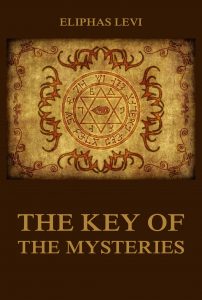The Key Of The Mysteries – Eliphas Levi
This volume represents the high-water mark of the thought of Eliphas Levi. It may be regarded as written by him as his Thesis for the Grade of Exempt Adept, just as his “Ritual and Dogma” was his Thesis for the grade of a Major Adept. He is, in fact, no longer talking of things as if their sense was fixed and universal. He is beginning to see something of the contradiction inherent in the nature of things, or at any rate, he constantly illustrates the fact that the planes are to be kept separate for practical purposes, although in the final analysis they turn out to be one. This, and the extraordinarily subtle and delicate irony of which Eliphas Levi is one of the greatest masters that has ever lived, have baffled the pedantry and stupidity of such commentators as Waite.
Format: Paperback.
The Key Of The Mysteries.
ISBN: 9783849672621.
Available at amazon.com and other venues.
A definition of occultism (from wikipedia.com)
Occultism is the study of occult practices, including (but not limited to) magic, alchemy, extra-sensory perception, astrology, spiritualism, religion, and divination. Interpretation of occultism and its concepts can be found in the belief structures of philosophies and religions such as Gnosticism, Hermeticism, Kabbalah, Theosophy, Ancient Egyptian religion, Obeah, modern paganism, Eastern philosophy (including Indian philosophy), Western esotericism and Christian mysticism.
Goodrick-Clarke suggested that the varied forms of occultism share “a strong desire to reconcile the findings of modern natural science with a religious view that could restore man to a position of centrality and dignity in the universe”. From the 15th to 17th century, these ideas had a revival from about 1770 onwards, due to a renewed desire for mystery, an interest in the Middle Ages and a romantic “reaction to the rationalist Enlightenment”. Alchemy was common among important seventeenth-century scientists, such as Isaac Newton, and Gottfried Leibniz. Newton was even accused of introducing occult agencies into natural science when he postulated gravity as a force capable of acting over vast distances. “By the eighteenth century these unorthodox religious and philosophical concerns were well-defined as ‘occult’, inasmuch as they lay on the outermost fringe of accepted forms of knowledge and discourse”. They were, however, preserved by antiquarians and mystics.
(The text of the last section was taken from a Wikipedia entry and is available under the the Creative Commons Attribution-ShareAlike License.)
Publisher’s Note: This book is printed and distributed by Createspace a DBA of On-Demand Publishing LLC and is typically not available anywhere else than in stores owned and operated by Amazon or Createspace.

